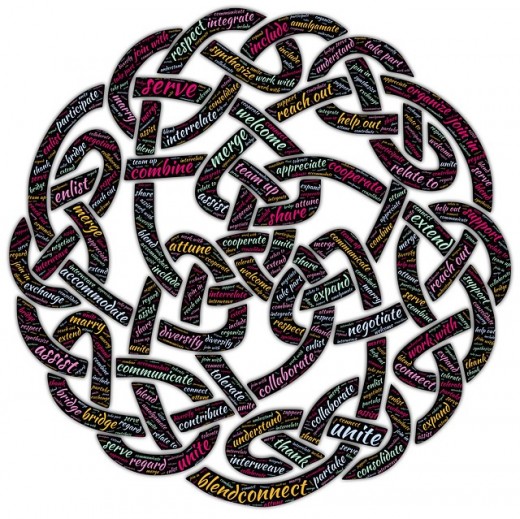Interconnection and Co-existence: Dependant Origination - The Law of Cause and Effect
Understanding The Law of Cause and Effect
According to the law of cause and effect, all phenomena are the result of causes and conditions. As such, they are impermanent. They go through the stages of formation, duration, decay, and disappearance. The time taken for each stage as well as for the cycle to complete itself varies from a split second ( like the popping up of a thought) to millions of years (like the formation of a geographical feature).
Buddha Shakyamuni called this the law of dependent or conditioned origination, i.e. the arising of phenomena depending on other phenomena, with no unchanging substance behind the phenomena. Something arises because other contributing factors also arise. Something ceases because other contributing factors also cease.
The gist of this universal truth of Dependent Origination is: "This arises because that arises, this ceases because that ceases". There is no one single cause responsible for the emergence of all phenomena; once a phenomenon has emerged, it cannot go on without the supporting conditions. It is like planting a seed. We provide favorable conditions for it to grow, such as sufficient water, sunlight and fertile soil. The seed will respond to these favorable conditions and eventually bear its own fruit. If the conditions are not favorable, the seed will wither.
Different conditions will produce different results. We cannot just plant the cause and expect it to bear results without giving it the right conditions. Acquiring a university degree does not automatically lead us to a good job. It depends on how we present ourselves, how other people recommend us, how favorable the job market is. A number of conditions work together to facilitate our hunting for a job.

However, many circumstances are beyond our control. Let us look at the two biggest events in our lives. We begin with birth and end with death. Birth is the cause and death is the result. We cannot avoid death once we are born. However, we can change the conditions to make our lives healthier and happier (and even longer).
It is up to us to create a favorable environment for our own well-being. If we understand that all phenomena are dependently originated, we will understand that we are a part of nature and that we are constantly interrelating with people and things in the external environment. This is what we call the network of interdependence.
We may not like it, but we cannot deny that life is full of ups and downs. It is because life is dependent on so many factors, all working in very complex, intermingled ways as life goes through its different stages. The many factors which keep life going on its bumpy path are also subject to change. Sensual and material pleasures will not ultimately make us happy. Why? It is because such pleasures come and go while creating more and more craving and thus blinding us to the nature of things as they truly are.
Much is beyond our control, and many are the desires beyond our reach. But fortunately for us, there is always one powerful factor which is absolutely under our control and that is our MIND, our way of thinking and looking at things. A positive mind obviously sees things very differently from a negative mind. The cold and dreary winter days can be inspiring for some and depressing for others.
All beings are interconnected and co-existing
If we understand and accept the fact of impermanence, the impermanence of all that is animate and inanimate in the universe, then we will find it easier to reflect on and contemplate things as they truly are. We shall then be able to see things more clearly. This is the surest way to restore our inner peace. Impermanence is not pessimism. Rather, it is realism.
Impermanence in itself is not a problem. The problem arises only when we see permanence in impermanence. Impermanence is actually full of wonders. It makes change possible; it makes room for transformation, improvement, and creativity. It is because of impermanence that "fate" is not irrevocably determined. Our so-called "fate" is subject to change in circumstances. It is only when we cling onto a SELF which gives us a sense of false security that we are afraid of impermanence.
We cling to past memories and habitual behaviors without seeing the ever-changing nature of ourselves and all phenomena. We fail to see how Dependent Origination works because we are only concerned about the results. We lament and regret when we fail or we are carried away by success, without reflecting on the causes and conditions leading to such results. A mind not able to see the true nature of phenomena is called the "deluded mind" by Buddha Shakyamuni. How can we be truly happy if we carry this deluded mind with us?
When we understand and accept the universal truth of Dependent Origination, we shall be able to bear dissatisfaction with greater courage and ease of mind, while accepting satisfaction with more gratitude and humility. It is because we shall know that good or bad situations do not last forever because the contributing conditions are changing all the time.
In coping with dissatisfaction, we should be thankful to the people and circumstances which have helped to make our dreams come true. If we constantly cultivate more and more favorable conditions within ourselves, outside conditions, too, will change in our favor.
Summary
Given the right conditions, a seed will germinate, grow, bloom and bear fruit. The fruit, in turn, will bear another seed awaiting the right conditions to start another cycle of existence. The appearance of all phenomena, including our own existence, depends on many factors which change all the time.
Impermanence is the true nature of everything. In our quest for security, we tend to solidify things and the biggest of all things to be so solidified is our SELF-image. We also attach ourselves to people and things, taking them as permanent. It is like going against the ever-changing tide. The more we grasp, the more we get trapped.
When we understand how the law of Dependent Origination affects our lives, we can become more tolerant, more accommodating, more grateful, and even more compassionate.









